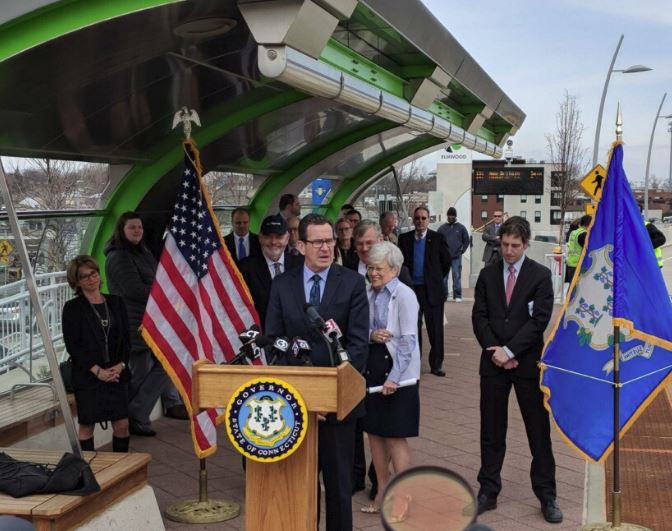HARTFORD, CT – Governor Dannel P. Malloy, Lt. Governor Nancy Wyman, Connecticut Department of Transportation Commissioner James P. Redeker, and advocates today celebrated the third anniversary of the launch of CTfastrak bus service, the state’s bus rapid transit system. Ridership on the service surpassed 15 million in March and continues to grow, and important economic development projects continue along the route.
“CTfastrak has been an unequivocal success,” Governor Malloy said. “What was once a controversial and politically charged proposal has become an economic lifeline for many residents – giving people access not just to transportation, but to jobs and economic opportunities. In three years’ time, we have now seen 15 million riders. To put that in perspective, that translates to the equivalent of over four trips for every single person living in Connecticut. And it has been a catalyst toward revitalizing communities. New housing and businesses are popping up along the route. Despite political opposition, these are the types of investments Connecticut should be making if we want to make our state more attractive for families and for businesses.”
“I applaud Governor Malloy and Commissioner Redeker for their leadership on transportation,” Lt. Governor Wyman said. “CTfastrak is only three years old, but these have been an impressive three years. Ridership has exceeded expectations and Connecticut residents quickly embraced a new, modern transportation system into their daily lives – the first major update to transit in decades.”
“This is a remarkable success story, with growing ridership and local development,” Commissioner Redeker, whose department oversees CTfastrak operations, said. “With an average of more than 16,000 trips a day, CTfastrak has exceeded everyone’s most optimistic expectations. It has also proven to be an important driver of the region’s economy.”
“CTfastrak has placed the metro Hartford region among the top ten with the greatest increase in access to jobs,”Lyle Wray, Executive Director of Capitol Region Council of Governments, said. “This and the growing development around CTfastrak stations builds on the three million rides per year in this corridor.”
“Not only has the CTfastrak been extremely successful for mobility over the past three years, but it has helped spur transit-oriented development that otherwise would not have been realized,” Department of Economic and Community Development Deputy Commissioner David Kooris said. “The importance of transit-oriented development projects, such as this one in West Hartford, are a proven strategy to add long-term value in our communities and continue to position Connecticut for success.”
The Governor also reiterated his call for additional revenue to ensure the short and long-term solvency of the Special Transportation Fund (STF), which, without prompt action, will be in deficit by fiscal year 2019, which beginsJuly 1, 2018. Implementation of the administration’s plan for the STF would restore canceled state and municipal projects across Connecticut, and would prevent drastic increases in rail and bus fares and major service reductions on Metro-North, Shore Line East, and CTtransit bus services. Without the reinstatement of canceled projects, Connecticut’s infrastructure will fall further into a state of disrepair, making our roads and bridges less safe for residents and harming the state’s economy.
“Without transportation, we cannot have transit-oriented development, and investment in our infrastructure should not be seen as optional,” the Governor continued. “The state has been forced to cancel or postpone $4.3 billion in projects across Connecticut, almost all of which are aimed at keeping our roads and bridges back in a state of good repair. We simply cannot afford to allow our infrastructure to fall further behind even as our neighbors make much-needed investments.”
In 1997, Connecticut’s gas tax was reduced from $0.39 per gallon to $0.25 per gallon and it has not been increased since. Over the same period, rail fares have increased by 54 percent and bus fares have increased by 75 percent. And while Connecticut has refused to increase transportation revenue, 26 states – including eight in the past year – have increased their gas taxes. This isn’t limited to “blue” states; it includes GOP-dominated states like South Carolina and Tennessee. In 2016, New Jersey’s former GOP Governor Chris Christie signed a $0.23 per gallon increase in the gas tax.
The Governor’s proposal takes four specific actions in order to stabilize the STF and bring critical projects back online:
- A seven-cent increase in the gas tax, gradually implemented over a four-year period.
- Implementation of statewide electronic tolling beginning in fiscal year 2023.
- Acceleration of the transfer of car sales tax by two years.
- Establishment of a $3.00 per tire fee on tire purchases.


Conn has TWO taxes on gasoline so the tax per gallon is not.25 it’s .47. Less government, not more taxes and fees!!